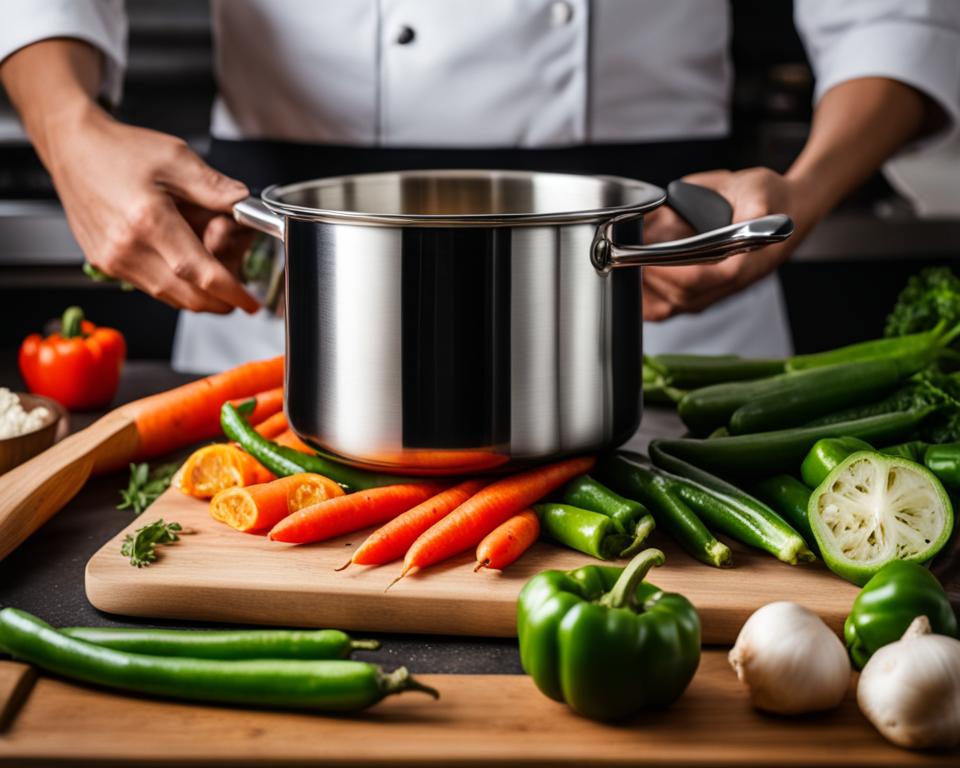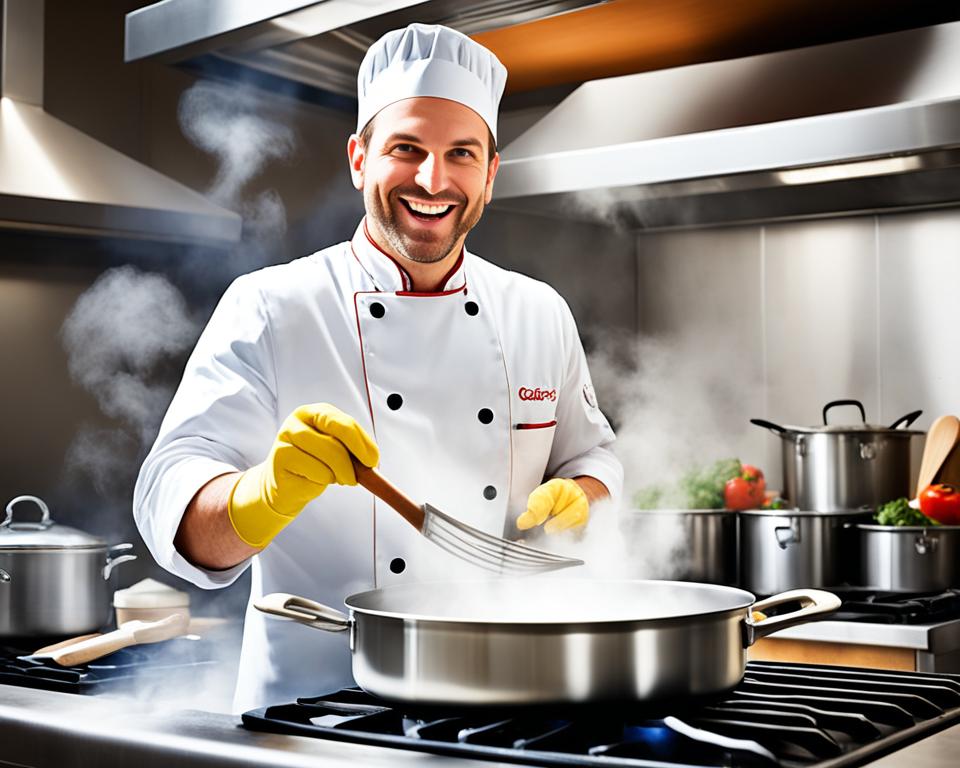How to maintain cookware
Cookware is an essential part of any kitchen, but it can be expensive to replace. By following these tips, you can help to extend the lifespan of your cookware and keep it in good condition.
Here are some tips for maintaining cookware:
- Clean cookware thoroughly after each use.
- Use the right cleaning products for the type of cookware.
- Avoid using harsh chemicals on cookware.
- Season cookware properly.
- Store cookware properly.
- Prevent rust.
- Repair damaged cookware.
- Replace cookware when necessary.
By following these tips, you can help to keep your cookware in good condition and extend its lifespan.
Types of Cookware
There are many different types of cookware available on the market, each with its own unique advantages and disadvantages. Some of the most common types of cookware include:
- Stainless steel
- Cast iron
- Aluminum
- Copper
- Nonstick
Each type of cookware has its own unique set of properties, so it is important to choose the right type for the job. For example, stainless steel is a good choice for general cooking, while cast iron is a good choice for searing and browning meat. Aluminum is a good choice for boiling and steaming, while copper is a good choice for conducting heat evenly. Nonstick cookware is a good choice for those who want to avoid using oil or butter when cooking.
It is also important to consider the size and shape of your cookware when making a purchase. You will need to choose pots and pans that are large enough to accommodate the amount of food you typically cook. You will also need to choose pots and pans that have the right shape for the type of cooking you do. For example, if you do a lot of stir-frying, you will need a wok.
III. Cleaning Cookware
Cleaning cookware is essential to keep it in good condition and extend its lifespan. The type of cookware you have will determine the best way to clean it.
Here are some general tips for cleaning cookware:
- Always wash cookware after each use.
- Use a mild detergent and warm water.
- Avoid using harsh chemicals or abrasive cleaners, as these can damage the cookware.
- Rinse cookware thoroughly and dry it immediately.
For specific cleaning instructions, refer to the manufacturer’s instructions.
IV. Seasoning Cookware
Seasoning cookware is the process of creating a protective layer on the surface of the cookware that helps to prevent food from sticking and makes it easier to clean. Seasoning is especially important for cast iron cookware, but it can also be done on other types of cookware, such as stainless steel and carbon steel.
To season cookware, you will need:
- Cookware (cast iron, stainless steel, or carbon steel)
- Oil (vegetable oil, canola oil, or olive oil)
- Paper towels
- Heat source (oven or stovetop)
Instructions:
- Preheat your oven to 350 degrees Fahrenheit.
- Wipe the cookware down with a paper towel to remove any dirt or grease.
- Pour a thin layer of oil onto the cookware and spread it around with a paper towel.
- Place the cookware in the oven and bake for 30 minutes.
- Remove the cookware from the oven and let it cool completely.
Your cookware is now seasoned and ready to use!
Here are some tips for seasoning cookware:
- Use a high-quality oil that has a high smoke point, such as vegetable oil, canola oil, or olive oil.
- Make sure to apply a thin layer of oil to the cookware.
- Bake the cookware for the recommended amount of time.
- Let the cookware cool completely before using it.
By following these tips, you can season your cookware properly and ensure that it will last for years to come.
V. Storing Cookware
Storing your cookware properly can help to extend its lifespan and prevent damage. Here are a few tips for storing cookware:
* **Dry your cookware thoroughly after each use.** Moisture can cause rust and corrosion, so it’s important to make sure that your cookware is completely dry before storing it.
* **Store your cookware in a cool, dry place.** Extreme heat or cold can damage cookware, so it’s best to store it in a place where it will be protected from the elements.
* **Use protective pads or covers when storing cookware.** This will help to prevent scratches and other damage.
* **Don’t stack your cookware.** Stacking cookware can put pressure on the cookware and cause it to warp or crack.
* **Don’t store cookware with sharp objects.** Sharp objects can scratch or damage your cookware.
By following these tips, you can help to keep your cookware in good condition and extend its lifespan.
How to maintain cookware
Cookware is an essential part of any kitchen, but it can be expensive to replace. By following these tips, you can help to maintain your cookware and extend its lifespan:
- Clean your cookware after each use.
- Use the right detergent for your cookware.
- Avoid using harsh chemicals on your cookware.
- Season your cookware regularly.
- Store your cookware properly.
- Prevent rust by drying your cookware thoroughly after washing.
- Repair damaged cookware as soon as possible.
- Replace your cookware when it is no longer in good condition.
By following these tips, you can help to keep your cookware in good condition and extend its lifespan.
VII. Repairing Cookware
If your cookware is damaged, it may be possible to repair it. Here are a few tips:
* **Check for cracks or chips.** If your cookware has cracks or chips, it is not safe to use.
* **Check for dents.** Dents can cause food to stick to the cookware and make it difficult to clean.
* **Check for rust.** Rust can damage the cookware and make it difficult to clean.
If your cookware is damaged, you can try to repair it by following these steps:
1. **Clean the cookware thoroughly.** This will remove any dirt or debris that could interfere with the repair process.
2. **Apply a sealant to the damaged area.** This will help to protect the cookware from further damage.
3. **Let the sealant dry completely.** Once the sealant is dry, you can use the cookware as usual.
If you are not comfortable repairing your cookware yourself, you can take it to a professional for repairs.Replacing Cookware
When your cookware is damaged beyond repair, it’s time to replace it. Here are a few things to keep in mind when choosing new cookware:
- The type of cookware you need will depend on the types of dishes you cook.
- Consider the material of the cookware. Different materials have different properties, so you’ll need to choose one that’s best suited for your needs.
- Look for cookware that’s easy to clean and maintain.
- Invest in quality cookware that will last.
Here are a few tips for replacing your cookware:
- Shop around for the best deals. You can often find great deals on cookware at discount stores or online retailers.
- Consider buying used cookware. You can find some great deals on used cookware at thrift stores or online marketplaces.
- If you’re not sure what type of cookware you need, ask a salesperson for help. They can help you find the right cookware for your needs and budget.
Replacing your cookware can be a great way to improve your cooking experience. By choosing the right cookware, you can make cooking easier, more enjoyable, and more successful.
Tips for Buying Cookware
When you are shopping for cookware, there are a few things you should keep in mind in order to make the best decision for your needs.
- Consider the type of cooking you will be doing. If you plan on doing a lot of searing or frying, you will need cookware that can withstand high heat. If you plan on doing a lot of slow cooking, you will need cookware that can retain heat well.
- Choose a material that is durable and easy to clean. Stainless steel is a good option for most people, as it is durable, non-stick, and easy to clean. Cast iron is another good option, but it requires more care and maintenance.
- Consider the size of your cookware. Make sure you have enough pots and pans to meet your needs, but don’t buy more than you will actually use.
- Read reviews before you buy. This can help you to get a good idea of the quality of the cookware and whether it is a good fit for your needs.
By following these tips, you can choose the best cookware for your needs and enjoy cooking for many years to come.


